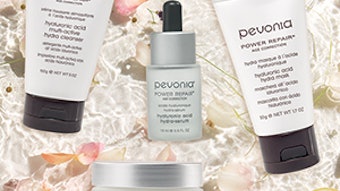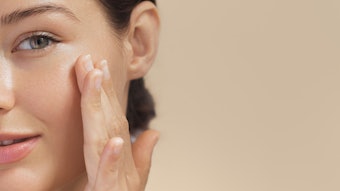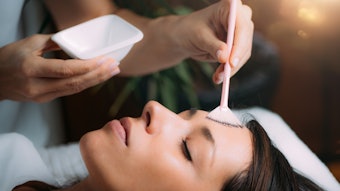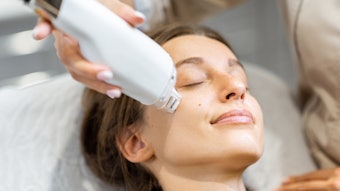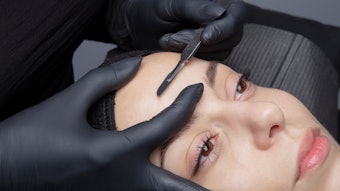
Clients come into the spa or medical spa for a number of reasons, chief among them being: excessive hair, unwanted tattoos, sagging, ingrown hairs, dark spots, acne and sun damage. Although these skin issues can affect anyone, at almost any age, skin color and ethnicity are important variants when it comes to achieving optimal results safely.
There are lingering misconceptions about laser hair removal on darker skin tones.
Unfortunately, there is some misinformation out there, and receiving the wrong treatment for your skin color can leave behind both emotional and physical scars. This article lists each of the above common skin concerns, noting which treatments can be used for skin of color and which ones should be avoided.
Excessive Hair
There are lingering misconceptions about laser hair removal on darker skin tones. Because earlier technology had difficulty distinguishing between hair follicle and surrounding skin, machines tended to heat up both areas significantly. Results were often uneven, unsuccessful or worse, damaging. But that was then and this is now. Today’s technology offers several different wavelengths of laser energy that can be safely and effectively used on most skin types.
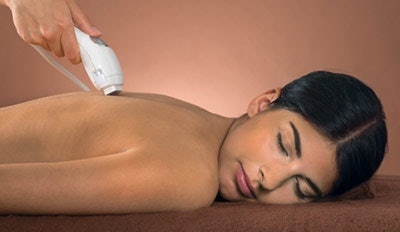
Yes. The 1,064 nm YAG laser is a good choice for darker skin. It can also be used to thin out areas with excessive hair.
Avoid. Intense pulsed light (IPL) technology and laser wavelengths other than 1,064 nm (such as 755/810 nm) should not be used on skin of color. Some vendors will promote their safety and efficacy on darker skin, but I believe it’s too risky. Some will tell you that IPL is perfectly safe to use on all skin colors as long as low settings are used, when the majority of laser injuries that I’ve seen over the past decade have been caused by the use of IPL on darker skin types (Fitzpatrick V-VI). It is always better to err on the side of caution, and ensure that your laser technician is both properly educated and experienced.
Sagging
Because of extra melanin, darker skin tones typically do not see wrinkles until later (40-50 years). However, they are just as susceptible to sagging, particularly around the jaw line.
Yes. The 1,064 nm YAG laser, radiofrequency and light ablative lasers can be used on skin of color.
“The 1,064 nm laser facial rejuvenation is one of the best treatments to improve tone, volume, tightening and even active acne for skin of color. For optimal results, it can be combined with radiofrequency or light ablative lasers with an appropriate pre-treatment to improve texture caused by acne, scarring and sun damage,” explained Sandra Nash, an esthetician and certified laser technician at National Laser Institute.
Avoid: IPL treatments should be avoided by skin of color.
Ingrown Hairs and Razor Bumps
Many people with darker skin, particularly those with curly hair, struggle with these, which are caused by inflamed hair follicles. However, if treated improperly (or left untreated), hyperpigmentation, pain and keloid scarring can result.
Yes. Laser hair removal treatments are safe for skin of color and effective because they destroy the hair follicle, thereby reducing inflammation.
Avoid. IPL treatments (see above).
Unwanted Tattoos
You might have heard that laser tattoo removal is more challenging in darker skin tones, but that has also changed. In the wrong hands, darker skinned clients are at greater risk for both hyper- (dark spots) and hypopigmentation (light spots), as well as keloid scars (overgrowth of scar tissue at the site of treatment), because there is less contrast between the skin’s melanin and the tattoo’s ink.
Yes. The 1,064 nm YAG laser is the preferred choice for tattoo removal on skin of color, producing the least amount of collateral damage to the epidermis.
Avoid. Aggressive laser tattoo removal treatments should be avoided by skin of color, as well as any laser technician who even suggests using IPL or wavelengths other than 1,064 YAG to remove a tattoo.
Dark Spots
There are several ingredients on the market, such as hydroquinone and kojic acid, used to lighten skin, which might be useful in treating dark spots caused by sun exposure and hormonal fluctuations. Skin lighteners work by inhibiting tyrosinase, a key factor in melanin production, but skin lighteners should be used cautiously, as they might counteract other ingredients, such as benzoyl peroxide and hydrogen peroxide.Yes. Gentler skin lighteners, such as glycolic acid and mild retinols, can be used on skin of color. Skin of all colors can also use hydroquinone and kojic acid with caution, but these should be first discussed with a dermatologist or experienced esthetician.
Avoid. Overuse of any skin lightener should be avoided, as this can lead to skin that is several shades lighter than the rest of the body.
Acne and Scars
In darker complexions, acne is treated in basically the same way as any other complexion, but there is an added concern of skin lightening or darkening. Although acne is caused by the same common factors in all skin colors (excess oil, clogged pores, bacteria, inflammation and hormonal fluctuations), inflamed pigment cells in skin of color can lead to dark spots that linger indefinitely. Those inflamed pigment cells can be triggered by either treatment delay or aggressiveness.
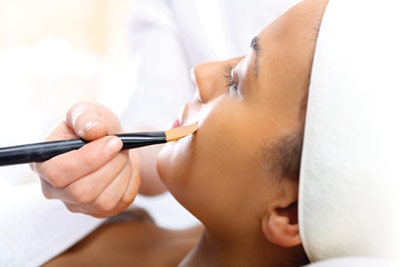
Yes. A series of chemical peels or 1,064 nm laser facial rejuvenation can be used on skin of color. Another treatment for acne scars as well as wrinkles is microneedling, a device that delivers tiny needle pricks to stimulate the skin’s natural healing process.
Avoid. IPL treatments should be avoided because of inconsistent results. Also avoid excessive treatments with harsh products, such as benzoyl peroxide. Treat skin kindly.
Sun Damage
Darker skin contains more melanin, which provides some defense against the sun, at least in the visible sense. However, darker skin does burn and can be damaged by ultraviolet light. All tanned skin is the result of DNA damage, regardless of color. Sun exposure causes wrinkles, uneven skin tone and an increased chance of certain types of skin cancer, including melanoma.

Yes. A broad-spectrum sunscreen applied daily should be used by all skin color. This sunscreen should be reapplied at regular intervals when spending long hours outdoors. Darker skin tones often avoid mineral-based sunscreens for fear that it will make their skin look chalky, but there are a number of micronized products on the market today that blend in well and leave no white residue. Dark spots caused by sun exposure can be treated with chemical peels, skin lighteners or light ablative lasers (see Dark Spots).
Avoid. All skin tones should never skip their sunscreen.
Spa Protection
As noted above, skin color and ethnicity are important variants in skin treatments to achieve optimal results safely. If the wrong procedure is performed for a darker skin tone, not only does the individual not receive optimal results and not return to your spa, but the health of their skin and its appearance might be compromised. Knowing how skin pigment and certain treatments interact can ensure happy, returning clients and protect your spa from legal trouble. Today’s range of spa treatments allow for all skin tones to defy age.



